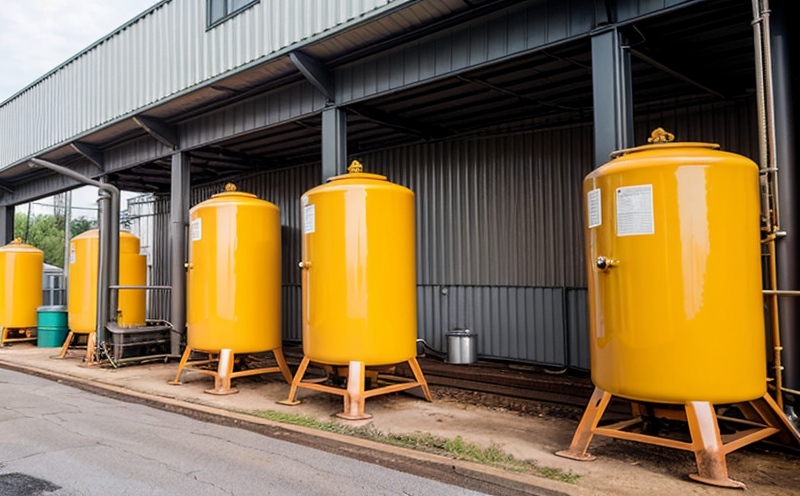IEC 61508 Functional Safety of Electrical Systems Compliance Testing
The International Electrotechnical Commission (IEC) Standard IEC 61508 sets the benchmark for functional safety in electrical and programmable electronic systems. This standard is critical for ensuring that industrial control systems, including those used in manufacturing processes, meet stringent safety requirements to protect personnel and assets.
Compliance with IEC 61508 ensures that a system's functionality can be maintained even under adverse conditions and that any faults are detected and handled appropriately. This is particularly important for complex systems where failures could lead to catastrophic consequences, such as in automotive manufacturing, process industries, or chemical plants.
Our lab provides comprehensive testing services tailored to IEC 61508 compliance, covering all aspects of the standard's functional safety lifecycle. From initial design validation through commissioning and maintenance, our experts ensure that your industrial systems are rigorously tested and certified against international standards.
The testing process includes a series of steps designed to evaluate system integrity at both hardware and software levels. Key areas include:
- System hazard analysis
- Fail-safe design evaluation
- Redundancy assessment
- Testing for fault tolerance and error handling
- Safety documentation review
We use cutting-edge tools and equipment to simulate real-world scenarios that could challenge the reliability of your systems. This includes advanced software simulators, high-fidelity hardware-in-the-loop setups, and comprehensive data analysis capabilities.
| Test Phase | Description | Tools & Equipment |
|---|---|---|
| Hazard Analysis | Determining potential hazards and their impact on safety. | Analytical software for risk assessment |
| Design Validation | Evaluating system design to ensure it meets functional safety requirements. | Simulation tools, CAD models |
| Testing & Verification | Conducting tests under controlled conditions to verify system performance. | Environmental chambers, high-fidelity simulators |
Scope and Methodology
The scope of our IEC 61508 compliance testing includes a thorough examination of the functional safety lifecycle, focusing on the following key phases:
- System hazard identification and analysis
- Functional safety requirements definition
- Design validation
- Testing and verification
- Documentation review
- Continuous improvement
We follow a structured methodology that adheres to the hierarchical approach outlined in IEC 61508. This ensures that each phase is meticulously planned, executed, and documented.
The testing methodologies we employ are based on internationally recognized standards such as ISO/IEC TR 13209-1 for risk assessment and safety integrity level (SIL) determination. Our experts use these guidelines to ensure that your systems meet the required SIL levels, which range from SIL 1 to SIL 4.
Our methodology also includes:
- Conducting hazard analysis using fault tree and event tree analyses
- Evaluating system architecture for safety integrity
- Simulating real-world scenarios to test system response under adverse conditions
- Performing static and dynamic testing of software and hardware components
International Acceptance and Recognition
The IEC 61508 standard is widely recognized across the globe, with numerous countries adopting it as a national standard. This broad acceptance ensures that compliance testing conducted in our lab meets global standards.
- Australia (AS/NZS IEC 61508)
- Brazil (ABNT NBR ISO/IEC TR 13209-1)
- Canada (CSA Standard Z475.1)
- China (GB/T 20438)
- European Union (EN ISO 26262, EN 50128)
- India (IS 19862:2011)
- Japan (JIS C 7849-2)
- New Zealand (AS/NZS IEC 61508)
Our lab is accredited to perform testing according to the latest versions of these standards, ensuring that your compliance testing meets global regulatory requirements.
By partnering with us for IEC 61508 compliance testing, you ensure that your industrial systems are not only safe but also meet international expectations and regulations. This is crucial for industries such as automotive, aviation, process control, and others where functional safety is paramount.
Use Cases and Application Examples
| Application | Description |
|---|---|
| Automotive Manufacturing | Testing of control systems for braking and engine management. |
| Process Industries | Evaluation of safety instrumented systems in chemical plants. |
| Aviation Industry | Verification of avionics and flight control systems. |
| Pharmaceutical Manufacturing | Assessment of automation in production lines to ensure drug quality. |
Each application requires a tailored approach, leveraging our expertise and state-of-the-art facilities. For instance, in the automotive sector, we focus on testing systems that could impact vehicle safety directly. In process industries, we emphasize the evaluation of complex systems to prevent accidents or environmental damage.





